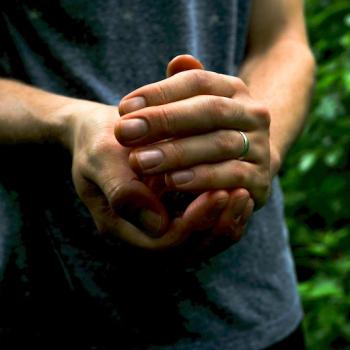 A naturalist affirms that every human person is exactly identical with his or her body. You are your body, which is a strictly physical thing. Our bodies are naturally animated by physical energy. But the energy in the body does not flow randomly. On the contrary, it is shaped by all the feedback loops in the body. Shaped by those loops in the body, it drives the body away from some of its possible states and towards others. The energy of the body strives away from some states and towards others. The directionality of that striving points away from negative states and towards positive states. When it is thought of as a naturally directed striving, it is appropriate to think of the energy in the body as spirit. Spirit drives the body away from negative states and towards positive states. It drives the body towards its perfection. It points towards an ideal body.
A naturalist affirms that every human person is exactly identical with his or her body. You are your body, which is a strictly physical thing. Our bodies are naturally animated by physical energy. But the energy in the body does not flow randomly. On the contrary, it is shaped by all the feedback loops in the body. Shaped by those loops in the body, it drives the body away from some of its possible states and towards others. The energy of the body strives away from some states and towards others. The directionality of that striving points away from negative states and towards positive states. When it is thought of as a naturally directed striving, it is appropriate to think of the energy in the body as spirit. Spirit drives the body away from negative states and towards positive states. It drives the body towards its perfection. It points towards an ideal body.
The ancient Stoics thought of the spirit (the pneuma) as a kind of flame burning in the body. Since every cell in your body is a heat engine powered by oxidation, this Stoic image of spirit as fire is scientifically accurate. But if spirit strives for the perfection of the body, then that perfection is present in spirit as a potentiality. It is present in spirit like the oak is present in the acorn or like the butterfly is present in the caterpillar. And if spirit is thought of as a fire, then the presence of that perfection in spirit can be thought of as its light. The fire burning in every cell in your body radiates light. Since this light is the perfection of the body, it can be described as a holy light. It is holy because it is the presence of perfection in the body. Thus spiritual naturalism conceives of the body as a lamp lit with a spiritual flame which radiates a holy light.
Spirit strives for the perfection of your body. And just as spirit strives for this perfection, so the holy light in your body strives to shine out of every part of your body. It strives to shine out of your genes, your mitochondria, your cells, your organs. But the parts of your body can either cooperate with each other or conflict with each other. On the one hand, a body whose parts interact more cooperatively is more harmonious; it is more transparent to the holy light; it shines more brightly. Its brightness is its glory. Its glory emerges in the body as health and virtue; its glory emerges from the body as ethical behavior. On the other hand, a body whose parts interact in conflict is less harmonious; it is more opaque to the holy light; it shines only dimly. Its darkness is the shadow formed as light fights against light. Its darkness emerges in the body as illness and vice. Its darkness emerges from the body as unethical action.
Anything you do to your body either serves its internal cooperation or conflict. Any action which serves its cooperation is a spiritual action. It is spiritual because it aims to optimize the flow of spirit through the body. By optimizing this flow, it aims to drive the body with maximal force towards the perfection of its being. Spiritual actions are things we do to our bodies in order to transform us from less healthy bodies to more healthy bodies, from less virtuous bodies to more virtuous bodies. Spiritual actions aim at self-clarification and self-purification. They strive to enable the holy light of bodily perfection to shine out more brightly through our bodies and into the world. Since all actions which aim at health aim at the perfection of the body, they are spiritual.
All medical actions are spiritual actions. So all acts which aim to prevent illness are spiritual. Getting vaccinated is spiritual. Acts which aim to cure infection and injury are spiritual. Taking antibiotics to cure an infection is spiritual. Getting a broken bone set is spiritual. Regularly repeated spiritual actions are spiritual practices. Many spiritual practices involve only self-care. You can be your own doctor. Spiritual self-care includes brushing your teeth every day and exercising regularly. Dietary practices which aim to optimize your weight are spiritual practices. However, the treatments for many diseases require medical experts. They are spiritual disciplines which require doctors. Yet even here self-care comes first. Thus spiritual naturalists work to define the ideal of the virtuous medical patient, as an active seeker of health.
Spiritual actions are skillful activities. They involve techniques. Mindfulness meditation involves techniques of breathing and mental focus. Yoga involves techniques of positioning the body. When you participate in techniques of breathing or posture, you are using your own body as a tool. The ancient Roman Stoics advocated moral journaling, in which you keep a daily record of your efforts to become more virtuous. Moral journaling requires tools like pencils and paper. During ancient Roman times, those were advanced technologies. Today you might do your moral journaling with a smartphone or a Fitbit. You might use your smartphone to track your steps, track your mood, count your calories, or monitor your sleep or breathing.
All spiritual practices involve tool use. Although humans are not the only animals to use tools, the use of tools is an essential part of what it means to be human. Dropped naked into a forest, you will either quickly equip yourself with tools or you will die. All tools are equally natural. For a naturalist, it makes no sense to say that some things are more natural than others. All things are equally natural. All the things you can do with or to your body are equally natural. Taking aspirin is as natural as drinking water. Monitoring your sleep with a smartphone is a natural as doing meditation. Taking an antidepressant is as natural as doing yoga. Some things (and practices) might be more or less artificial than others, but all artificial things and practices are equally natural.
Since spiritual practices aim to clarify the body, so that it shines more brightly with holy light, all those practices are sacred. Diabetics need to monitor their blood sugar. The glucose meter is a sacred tool; testing the blood is a sacred technique. Diabetics also need to give themselves insulin. The syringe is a sacred tool; injecting the insulin is a sacred technique. The insulin itself is a sacred molecule. Any sacred molecule is a sacrament. For spiritual naturalists, the sacredness of any tool or technique or substance is conferred by scientific validation. Things are made sacred by sanctification or consecration. They are sanctified by science, which provides evidence that those things are safe and effective ways for the body to perfect itself. It is therefore an essential task of spiritual naturalism to catalog safe and effective techniques of self-care.
Spiritual practices are transformative: they change you in ways that may be impossible to predict. All such transformative practices are experiments. Hence the core of spiritual naturalism is self-experimentation. Spiritual naturalists apply the experimental method to their bodies in order to optimize their natures. Applying the experimental method to your body is often described as hacking your body. To live a spiritual life is to hack your body for the sake of perfecting your body. If you do meditation, or yoga, or eat a gluten-free diet, or take antidepressants, then you’re hacking your body. All spiritual practices are life hacks, mind hacks, neurohacks, consciousness hacks. Spiritual naturalism can only benefit and grow by making closer contact with lifehacking communities.
Self-experimentation is risky. All practices carry both costs and benefits. If you need to change yourself, you always run the risk that your efforts will make you worse. If you take antidepressants, then you risk suffering serious side effects; if you don’t, you risk debilitating suffering. Buddhist meditation practices involve their own risks. Meditation can induce seizures, psychosis, and other harms. So you need to proceed deliberately, slowly, and often under the careful supervision of people who are trained to deal with adverse reactions. Some spiritual practices you can do fairly safely by yourself. Others require close monitoring by a doctor or well-trained teacher. Spirituality includes the virtue of wisdom: skill in balancing risks and benefits. And it includes the virtue of courage: the willingness to expose yourself to risks to gain benefits.
Spirituality requires accurate self-knowledge. You need to know how far you are from the perfection of your body. Unfortunately, we are all very biased when it comes to knowing our bodies. Accurate self-knowledge requires measurement. It requires self-quantification. The motto of the quantified self movement is: Self-knowledge through numbers. Self-tracking is spiritual. Spiritual practices include tracking your blood sugar with a glucose monitor, tracking your sleep with your smart phone, tracking your steps with a Fitbit. Spiritual naturalism can only benefit and grow by making closer contact with communities devoted to self-tracking and self-quantification. An essential task for spiritual naturalism is to catalog the techniques of self-measurement, and to correlate the measured qualities with its cataloged techniques of self-care.
The most general spiritual discipline is the cycle of self-experimentation. This cycle is the essence of hacking: experiment, test, learn, repeat. You start the cycle by measuring some aspect of your body which requires optimization. You set a goal for optimizing it. Through research, you select a method to try. This method is an experiment you will apply to yourself. You apply the method to yourself, all the while carefully tracking the results. Are you are moving towards your goal? If yes, you continue with your method; if no, you try to find another method. This cycle is sacred. It has been sanctified by the success of the experimental method in solving practical problems. The experimental method is the best method we have for problem-solving. Spiritual naturalists have faith in the experimental method; this faith is an enduring hope. It is the affirmation, based on scientific evidence, that a better future is always possible.
People struggle with spiritual problems. These include cancer, diabetes; obesity; rheumatoid arthritis; addictions to opiates, alcohol, gambling, pornography, video games; and so on. Spiritual problems include migraine disorders, depression, autism, schizophrenia, and so on. Spiritual problems include hatred, hostility, racism, misogyny, homophobia, xenophobia, and so on. As naturalists, spiritual naturalists regard all these problems as unclarities in the body. The holy light in the body cannot shine out through these unclarities. Spiritual naturalists are passionate about applying the experimental method to the body for the sake of its self-clarification. They are passionate about using tools and techniques to transform illness into health and vice into virtue. Every change from illness to health or vice to virtue is an act of self-transcendence. Spiritual naturalists passionately apply technologies of self-transcendence to their bodies.
Learn about Membership in the Spiritual Naturalist Society
__________
The Spiritual Naturalist Society works to spread awareness of spiritual naturalism as a way of life, develop its thought and practice, and help bring together like-minded practitioners in fellowship.
















